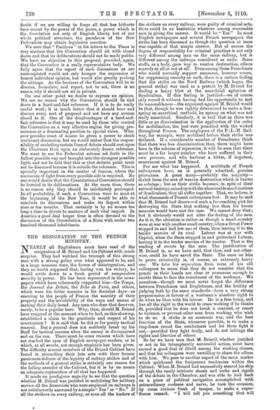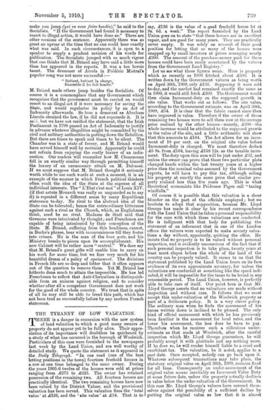THE RESIGNATION OF THE FRENCH MINISTRY. N EARLY all Englishmen must
have read of the resignation of M. Briand and his Cabinet with much surprise. They had watched the triumph of this strong man with a strong policy over what appeared to be, and in a large measure were, the forces of disintegration, and they no doubt supposed that, having won his victory, he would settle down to a fresh period of comparative security in power. He has been represented in the news- papers which have vehemently supported him—the Temps, the Journal des Debals, the Echo de Paris, and others, which were his bitter enemies in his Socialist days—as ensuring to the people of France the sanctity of their property and the inviolability of the ways and means of earning their daily bread. Any man who does that deserves, surely, to be a popular hero. Why, then, should M. Briand have resigned at the moment when he had, on this showing, established a claim to the gratitude and respect of his countrymen ? It is said that he did so for purely tactical reasons. But a general does not suddenly break up his Staff for tactical reasons when the enemy is disorganised and on the run. There must be some reasons which have not reached the eyes of English newspaper readers, or to which, at all events, not enough emphasis has been given. The difficulty several members of the Briand Cabinet have found in reconciling their late acts with their former passionate defence of the legality of railway strikes and of the methods of a general strike is certainly one reason for the falling asunder of the Cabinet, but it is by no means an adequate explanation of all that has happened. It needs no prodigious sagacity to see that the question whether M. Briand was justified in mobilising for military service all the Reservists who were employed on railways is not satisfactorily answered by a simple" Yes "or "No.' If all the strikers on every railway, or even all the leaders of the strikers on every railway, were guilty of criminal acts, there could be no hesitation whatever among reasonable men in giving the answer. It would be "Yes." In most English newspapers and several French newspapers the strike has been discussed as though the question at issue was capable of that simple answer. But of course the degree of responsibility for criminal practices is not only very different among men on the same railway, but is different among the railways considered as units. Some staffs, as a, body, gave way to wanton destruction, others scarcely at all or not at all. Even among those Frenchmen who would normally support measures, however severe, for suppressing anarchy as such, there is a certain feeling that the strike on the Nord Railway (which began the general strike) was used as a pretext by M. Briand for dealing a, heavy blow at the anarchical agitation of Syndicalism. If this feeling is justified—we of course only record it without having had the opportunity to test its reasonableness—the argument against M. Briand would be that, though he was rightly determined to make a lion- spring on anarchical methods, he sprang on what was not really anarchical. Similarly, it is said that as there was little or no discrimination in the application of the order for mobilisation, the just were punished with the wicked throughout France. The employees of the P.-L.-M. Rail- way, for example, were mobilised before their strike was declared. If a considerable number of Frenchmen think that there was less discrimination than there might have been in the scheme of repression, it will be seen that there must be a far larger number who have suffered in their own persons, and who harbour a bitter, if impotent, resentment against M. Briand.
For see what has happened. A multitude of French railwaymen have, as is generally admitted, genuine grievances. A great many—probably the majority— shrink from the sort of wanton destruction which is known as sabotage ; but as their strike becomes, in spite of their natural leanings, mixed up with the abominable machinations of Syndicalism, they all suffer together. That, we believe, is what thousands of French railwaymen feel. It may be said that M. Briand had discovered such a far-reaching plot for destroying the State that nothing less than his heroic measure would have met the case. We cannot deny that ; but it obviously would not alter the feeling of the men. As it is, the situation is rather as though a small country were at war with another small country, when a Great Power stepped in and laid low one of them, then leaving it to the tender mercies of its rival. Labour was at war with Capital, when the State stepped in and pulverised Labour, leaving it to the tender mercies of its master. That is the reading of events by the men. The justification of M. Briand is, as we have said, that thus, and not other- wise, could he have saved the State. The onus on hint to prove criminality is, of course, an extremely heavy one. We take his separation front some of his old colleagues to mean that they do not consider that the proofs in their hands are clear or numerous enough to enable them to face the resentment of the workmen. We ourselves—though we must never forget the difference between Frenchmen and Englishmen, and the futility of judging both by the same standards—have a very strong prepossession in favour of a workman's absolute right to do what he likes with his labour. He is a free being, and has all the right in the world to cease working if he thinks fit, provided that he does not break a contract, or resort to violence, or prevent other men from working who wish to do so. A strike is an economic war, and the best function of the State, whenever possible, is to make a, ring-fence round the combatants and let them fight it out,—provided they fight fairly, and do not infringe the rights and liberties of others. So far we have seen that M. Briand, whether justified or not in his triumphantly successful action, must have earned a good deal of illwill among the working classes, and that his colleagues were unwilling to share the odium with him. We pass to another aspect of the same matter which quickened the fissiparous tendencies within the Cabinet. When M. Briand had successfully steered his ship through the vastly intricate shoals and rocks and rapids of the debate in the Chamber, and was able to look back on a piece of iaolitical navigation accomplished with extraordinary coolness and nerve, he took the occasion, by some curious freak of temper, to make a super-. fluous remark. "I will tell you something that will make you jump (qui va vous faire bondir)," he said to the Socialists. "If the Government had found it necessary to resort to illegal action, it would have done so." There are other versions of the sentence. Apparently there was so great an uproar at the time that no one could hear exactly what was said. In such circumstances, it is open to a speaker to supply a prudent revision of his words for publication. The Socialists jumped with so much vigour that one thinks that M. Briand may have said a little more than has appeared in the reports. It was a too heroic taunt. The drummer of Arcola in Frederic Mistral's popular song was not more successful :— " Battant, battant la charge, Ensemble il les fait bondir."
M. Briand made others jump besides the Socialists. Of course it is a commonplace that any Government which recognises that the government must be carried on would resort to an illegal act if it were necessary for saving the State, and would regularise its policy by an Act of Indemnity afterwards. So true a democrat as Abraham Lincoln strained the law, if he did not supersede it. It is said, but we have not verified the statement, that the Irish Parliament in 1798 passed an Act of Indemnity to justify in advance whatever illegalities might be committed by the civil and military authorities in putting down the Rebellion. But there are times to speak and times to be silent. The Chamber was in a state of frenzy, and M. Briand would have served himself well by restraint. Apparently he could not refrain from enjoying the costly luxury of an indis- cretion. Our readers will remember how M. Clemenc,eau fell in an exactly similar way through permitting himself the luxury of an unnecessary attack on M. Delcasse. If we must suppose that M. Briand thought it seriously worth while to use such words at such a moment, it is an example of the manner in which French political thinkers often exalt the idea of the State at the expense of all individual interests. The" L'Etat c'est moi " of Louis XIV. (if that astute Monarch was really so unguarded as to say it) is repeated in a different sense by many Republican statesmen to-day. No rival to the abstract idea of the State can be tolerated ; hence the extraordinary bitterness against such a rival as the Church, which, as Englishmen think, need be no rival. Madame de Stahl said that Germans were intoxicated by thought ; and Frenchmen are capable of being intoxicated by their conception of the State. M. Briand, suffering from this headiness, cannot, in Burke's phrase, bear with inconveniences till they fester into crimes. He is the man of the beau geste, and his Ministry breaks to pieces upon its accomplishment. His new Cabinet will be rather more "central." We dare say that M. Briand's great gifts will enable him to carry on his work for some time, but we fear very much for his beautiful dream of a policy of a,paisenzent. The divisions in French life are so deep and bitter that it often appears out of the question to remove them. Yet M. Briand has hitherto done much to attain the impossible. He has led. Frenchmen to reflect that Anti-Clericalism is distinguish- able from an animus against religion, and. to consider whether after all a competent Government does not work for the good of the whole country. We trust that in spite of all he may still be able to tread this path, which has not been trod so successfully before by any modern French statesman.



































































 Previous page
Previous page